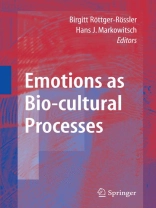Emotions have emerged as a topic of interest across the disciplines, yet studies and findings on emotions tend to fall into two camps: body versus brain, nature versus nurture. Emotions as Bio-cultural Processes offers a unique collaboration across the biological/social divide—from psychology and neuroscience to cultural anthropology and sociology—as 15 noted researchers develop a common language, theoretical basis, and methodology for examining this most sociocognitive aspect of our lives. Starting with our evolutionary past and continuing into our modern world of social classes and norms, these multidisciplinary perspectives reveal the complex interplay of biological, social, cultural, and personal factors at work in emotions, with particular emphasis on the nuances involved in pride and shame.
A sampling of the topics: (1) The roles of the brain in emotional processing. (2) Emotional development milestones in childhood. (3) Social feeling rules and the experience of loss. (4) Emotions as commodities? The management of feelings and the self-help industry. (5) Honor and dishonor: societal and gender manifestations of pride and shame. (6) Emotion regulation and youth culture. (7) Pride and shame in the classroom.
A volume of such wide and integrative scope as Emotions as Bio-cultural Processes should attract a large cohort of readers on both sides of the debate, among them emotion researchers, social and developmental psychologists, sociologists, social anthropologists, and others who analyze the links between humans that on the one hand differentiate us as individuals but on the other hand tie us to our socio-cultural worlds.
قائمة المحتويات
Prologue.- Homo Sapiens—The Emotional Animal.- Concepts and Approaches.- Emotions as Bio-cultural Processes: Disciplinary Debates and an Interdisciplinary Outlook.- On the Origin and Evolution of Affective Capacities in Lower Vertebrates.- Emotions: The Shared Heritage of Animals and Humans.- Neurobiological Basis of Emotions.- Milestones and Mechanisms of Emotional Development.- Gravestones for Butterflies: Social Feeling Rules and Individual Experiences of Loss.- Emotion by Design: Self-Management of Feelings as a Cultural Program.- Emotion, Embodiment, and Agency: The Place of a Social Emotions Perspective in the Cross-Disciplinary Understanding of Emotional Processes.- On the Nature of Artificial Feelings.- Empirical Studies—Shame and Pride: Prototypical Emotions Between Biology and Culture.- “Honor and Dishonor”: Connotations of a Socio-symbolic Category in Cross-Cultural Perspective.- “Honor and Dishonor” and the Quest for Emotional Equivalents.- End of Honor? Emotion, Gender, and Social Change in an Indonesian Society.- “Beggars” and “Kings”: Emotional Regulation of Shame Among Street Youths in a Javanese City in Indonesia.- The Search for Style and the Urge for Fame: Emotion Regulation and Hip-Hop Culture.- Shame and Pride: Invisible Emotions in Classroom Research.- Anger, Shame, and Justice: Regulative and Evaluative Function of Emotions in the Ancient and Modern Worlds.
عن المؤلف
PD Dr. phil. Birgitt Röttger-Rössler teaches Social Anthropology at the University of Göttingen. She studied social and physical anthropology as well as Malay languages and literatures at the Universities of Goettingen, Zurich, Cologne and Bonn. Her main research focuses on the cultural patterning of emotions as well as on gender relations, life history and autobiographical narrating; Indonesian and Malay literatures. She has accomplished several research projects concerning these topics and has conducted extensive ethnographic fieldwork in Indonesia, mainly in Sulawesi and Sumatra.
Hans Joachim Markowitsch is Professor of Physiological Psychology at the University of Bielefeld. He studied psychology and biology at the University of Konstanz, had professorships for biopsychology and physiological psychology at the Universities of Konstanz, Bochum, and Bielefeld and was offered chairs of psychology and neuroscience at Australian and Canadian Universities. His research centers on the neural and psychic bases of memory disorders, consciousness, emotion, and free will. He is author, co-author or editor of more than a dozen books and has written more than 450 scientific articles and book chapters












